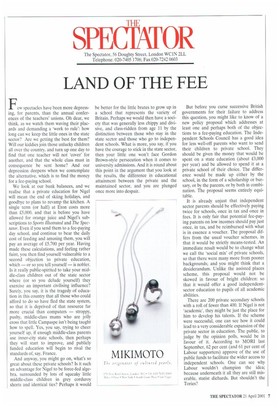SPECIATOR
The Spectator, 56 Doughty Street, London WC1N 2LL Telephone: 020-7405 1706; Fax 020-7242 0603
LAND OF THE FEE
Few spectacles have been more depressing, for parents, than the annual conferences of the teachers' unions. Oh dear, we think, as we watch them waving their placards and demanding a 'work to rule': how long can we keep the little ones in the state sector? Are we getting the best for them? Will our kiddies join those unlucky children all over the country, and turn up one day to find that one teacher will not 'cover' for another, and that the whole class must in consequence be sent home? And our depression deepens when we contemplate the alternative, which is to find the money for a fee-paying school.
We look at our bank balances, and we realise that a private education for Nigel will mean the end of skiing holidays, and goodbye to plans to revamp the kitchen. A single term (or half) at Eton costs more than £5,000, and that is before you have allowed for orange juice and Nigel's subscriptions to Sports Illustrated and The Spectator. Even if you send them to a fee-paying day school, and continue to bear the daily cost of feeding and amusing them, you will pay an average of £5.700 per year. Having made these calculations, and feeling rather faint, you then find yourself vulnerable to a second objection to private education, which — or so you tell yourself — is nobler. Is it really public-spirited to take your middle-class children out of the state sector where (or so you delude yourself) they exercise an important civilising influence? Surely, you say, it is the tragedy of education in this country that all those who could afford to do so have fled the state system, so that it is deprived of that resource far more crucial than computers — stroppy, pushy, middle-class mums who are jolly cross that little Campaspe isn't being taught how to spell. Yes, you say, trying to cheer yourself up, if enough middle-class parents use inner-city state schools, then perhaps they will start to improve, and publicly funded education will begin to rival the standards of, say, France.
And anyway, you might go on, what's so great about these private schools? Is it such an advantage for Nigel to be force-fed algebra, surrounded by lots of squeaky little middle-class children in grey corduroy shorts and identical ties? Perhaps it would be better for the little brutes to grow up in a school that represents the variety of Britain. Perhaps we would then have a society that was generally less chippy and divisive, and class-ridden from age 11 by the distinction between those who stay in the state sector and those who go to independent schools. What is more, you say, if you have the courage to stick in the state sector, then your little one won't face Gordon Brown-style persecution when it comes to university admissions. And it is round about this point in the argument that you look at the results, the difference in educational attainment between the private and the maintained sector, and you are plunged once more into despair. But before you curse successive British governments for their failure to address this question, you might like to know of a new policy proposal which addresses at least one and perhaps both of the objections to a fee-paying education. The Independent Schools Council has a good idea for less well-off parents who want to send their children to private school. They should be given the money that would be spent on a state education (about £3,000 per year) and be allowed to spend it at a private school of their choice. The difference would be made up either by the school, in the form of a scholarship or bursary, or by the parents, or by both in combination. The proposal seems entirely equitable.
It is already unjust that independent sector parents should be effectively paying twice for schools, once in tax and once in fees. It is only fair that potential fee-paying parents on low incomes should pay just once, in tax, and be reimbursed with what is in essence a voucher. The proposal differs from the usual voucher schemes, in that it would be strictly means-tested. An immediate result would be to change what we call the 'social mix' of private schools, so that there were many more from poorer backgrounds; and you might think that a desiderandum. Unlike the assisted places scheme, this proposal would not be skewed in favour of bright children: so that it would offer a good independentsector education to pupils of all academic abilities.
There are 200 private secondary schools with a roll of fewer than 400. If Nigel is not 'academic', they might be just the place for him to develop his talents. If the scheme were successful, one can see how it could lead to a very considerable expansion of the private sector in education. The public, to judge by the opinion polls, would be in favour of it. According to MORI last September, 62 per cent (and 61 per cent of Labour supporters) approve of the use of public funds to facilitate the wider access to independent schools. One can see why Labour wouldn't champion the idea; because underneath it all they are still miserable, statist diehards. But shouldn't the Tories?


































































 Previous page
Previous page